初中常用的前缀后缀
初中阶段常用的前后缀
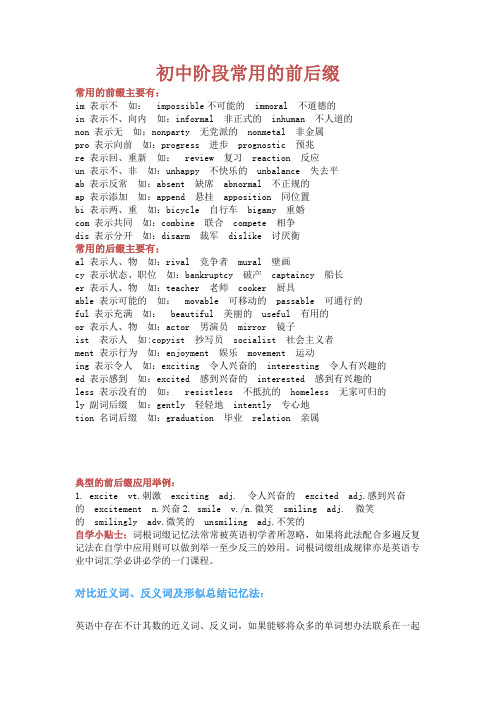
初中阶段常用的前后缀常用的前缀主要有:im 表示不如:impossible不可能的immoral 不道德的in 表示不、向内如:informal 非正式的inhuman 不人道的non 表示无如:nonparty 无党派的nonmetal 非金属pro 表示向前如:progress 进步prognostic 预兆re 表示回、重新如:review 复习reaction 反应un 表示不、非如:unhappy 不快乐的unbalance 失去平ab 表示反常如:absent 缺席abnormal 不正规的ap 表示添加如:append 悬挂apposition 同位置bi 表示两、重如:bicycle 自行车bigamy 重婚com 表示共同如:combine 联合compete 相争dis 表示分开如:disarm 裁军dislike 讨厌衡常用的后缀主要有:al 表示人、物如:rival 竞争者mural 壁画cy 表示状态、职位如:bankruptcy 破产captaincy 船长er 表示人、物如:teacher 老师cooker 厨具able 表示可能的如:movable 可移动的passable 可通行的ful 表示充满如:beautiful 美丽的useful 有用的or 表示人、物如:actor 男演员mirror 镜子ist 表示人如:copyist 抄写员socialist 社会主义者ment 表示行为如:enjoyment 娱乐movement 运动ing 表示令人如:exciting 令人兴奋的interesting 令人有兴趣的ed 表示感到如:excited 感到兴奋的interested 感到有兴趣的less 表示没有的如:resistless 不抵抗的homeless 无家可归的ly 副词后缀如:gently 轻轻地intently 专心地tion 名词后缀如:graduation 毕业relation 亲属典型的前后缀应用举例:1. excite vt.刺激exciting adj. 令人兴奋的excited adj.感到兴奋的excitement n.兴奋2. smile v./n.微笑smiling adj. 微笑的smilingly adv.微笑的unsmiling adj.不笑的自学小贴士:词根词缀记忆法常常被英语初学者所忽略,如果将此法配合多遍反复记法在自学中应用则可以做到举一至少反三的妙用。
初中前缀后缀单词大全
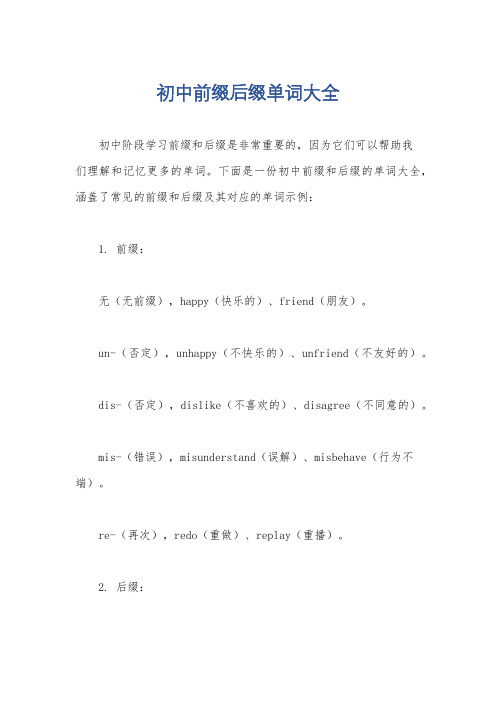
初中前缀后缀单词大全初中阶段学习前缀和后缀是非常重要的,因为它们可以帮助我们理解和记忆更多的单词。
下面是一份初中前缀和后缀的单词大全,涵盖了常见的前缀和后缀及其对应的单词示例:1. 前缀:无(无前缀),happy(快乐的)、friend(朋友)。
un-(否定),unhappy(不快乐的)、unfriend(不友好的)。
dis-(否定),dislike(不喜欢的)、disagree(不同意的)。
mis-(错误),misunderstand(误解)、misbehave(行为不端)。
re-(再次),redo(重做)、replay(重播)。
2. 后缀:无(无后缀),help(帮助)、jump(跳跃)。
-er(人或物),teacher(教师)、writer(作家)。
-ful(充满),helpful(有帮助的)、grateful(感激的)。
-ing(进行中),running(跑步的)、eating(吃饭的)。
-ed(过去式或完成式),played(玩过的)、finished(完成的)。
3. 前缀和后缀的组合:un+ -able(能够),unbelievable(难以置信的)、unbreakable(坚不可摧的)。
dis+ -ful(充满),disrespectful(不尊重的)、distrustful(不信任的)。
re+ -ing(进行中),rebuilding(重建中的)、relearning (重新学习的)。
这只是一小部分常见的前缀和后缀单词示例,还有很多其他的组合和变化。
通过学习前缀和后缀,我们可以更好地理解和记忆单词的意义和用法,提高我们的词汇量和语言表达能力。
希望这个单词大全对你有帮助!。
初中常用的前缀后缀
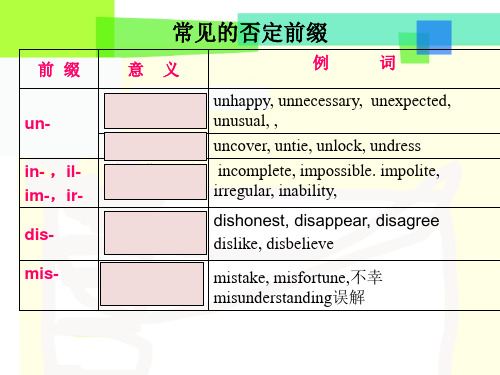
-less 表示否定
careless,endless,useless
-ous 有某种特征的 nervous,dangerous
-y 表示天气或特征 dirty,rainy
-ly 有某种特征的 friendly -ive 有某种特征的 active,expensive
抽象名词和集体名词的后缀
-age marriage, luggage, postage邮费
有/多... 的,想...的
cloudy, sunny, funny, sleepy
有...的, 有...特征的
tired, interested, learned博学
由...构(制)成的
wooden, woolen
...方向的
eastern, western, southern
有...性质的,...形状的
从事某工作的物 conductor导体
其他名词后缀
前缀 -ing -ion/ -tion/ -sion -ment
-ness
-ure -th
意义 状态
动作;过程
性质;状态 性质;状态 状态 性质,状态
例词 feeling,reading
action, decision, pollution, pronunciation
com-,con-, 共同,和 cor-,col-
co-
联合、共同
例词 asleep, along, aloud, alive, across, abroad在国 外,aboard 在船/火车/飞机上 comment, collect,
co-worker, coexist
1.再一次,重新 renew, reborn, rebuild,
英语单词的前缀和后缀

英语单词的前缀和后缀一、常见前缀。
1. un -- 音标:[ʌn]- 词性:可加在形容词、副词、名词前,表示否定。
- 例如:unhappy [ʌnˈhæpi](adj. 不快乐的),unusually [ʌnˈju:ʒuəli](adv. 不寻常地),unemployment [ˌʌnɪmˈplɔɪmənt](n. 失业)2. re -- 音标:[riː]- 词性:可加在动词前,表示“再,又;重新”。
- 例如:rewrite [ˌriːˈraɪt](v. 重写),rebuild [ˌriːˈbɪld](v. 重建)3. dis -- 音标:[dɪs]- 词性:可加在动词、形容词、名词前,表示否定或相反的意思。
- 例如:dislike [dɪsˈlaɪk](v. 不喜欢;n. 厌恶),disappear [ˌdɪs əˈpɪə(r)](v. 消失),dishonest [dɪsˈɒnɪst](adj. 不诚实的)4. in -(在字母l、m、p前变为im -,在字母r前变为ir -,在字母b、n、p前变为il -)- in -音标:[ɪn],im -音标:[ɪm],il -音标:[ɪl],ir -音标:[ɪr]- 词性:可加在形容词前,表示否定。
- 例如:inactive [ɪnˈæktɪv](adj. 不活跃的),impossible [ɪmˈpɒs əbl](adj. 不可能的),illegal [ɪˈliːgl](adj. 非法的),irregular [ɪˈreɡjələ(r)](adj. 不规则的)5. pre -- 音标:[priː]- 词性:可加在动词、名词、形容词前,表示“在……之前”。
- 例如:preview [ˈpriːvjuː](v. 预习;n. 预演),prewar [ˈpriːwɔː(r)](adj. 战前的)6. post -- 音标:[pəʊst]- 词性:可加在名词、形容词前,表示“在……之后”。
初中英语2024届中考复习前缀后缀汇总
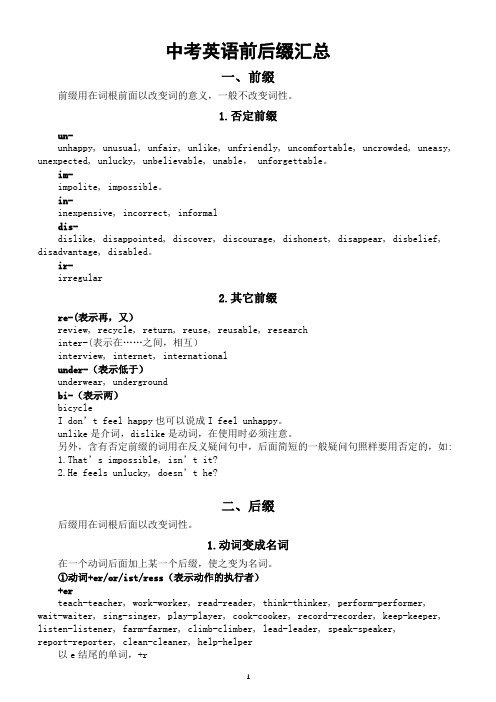
中考英语前后缀汇总一、前缀前缀用在词根前面以改变词的意义,一般不改变词性。
1.否定前缀un-unhappy, unusual, unfair, unlike, unfriendly, uncomfortable, uncrowded, uneasy, unexpected, unlucky, unbelievable, unable, unforgettable。
im-impolite, impossible。
in-inexpensive, incorrect, informaldis-dislike, disappointed, discover, discourage, dishonest, disappear, disbelief, disadvantage, disabled。
ir-irregular2.其它前缀re-(表示再,又)review, recycle, return, reuse, reusable, researchinter-(表示在……之间,相互)interview, internet, internationalunder-(表示低于)underwear, undergroundbi-(表示两)bicycleI don’t feel happy也可以说成I feel unhappy。
unlike是介词,dislike是动词,在使用时必须注意。
另外,含有否定前缀的词用在反义疑问句中,后面简短的一般疑问句照样要用否定的,如:1.That’s impossible, isn’t it?2.He feels unlucky, doesn’t he?二、后缀后缀用在词根后面以改变词性。
1.动词变成名词在一个动词后面加上某一个后缀,使之变为名词。
①动词+er/or/ist/ress(表示动作的执行者)+erteach-teacher, work-worker, read-reader, think-thinker, perform-performer,wait-waiter, sing-singer, play-player, cook-cooker, record-recorder, keep-keeper, listen-listener, farm-farmer, climb-climber, lead-leader, speak-speaker,report-reporter, clean-cleaner, help-helper以e结尾的单词,+rwrite-writer, drive-driver, dance-dancer, ride-rider, rule-ruler, manage-manager, make-maker重读闭音节词词尾只有一个辅音字母,元音发短音时,双写尾字母,再+errun-runner, win-winner, travel-travel(l)er+orvisit-visitor, act-actor, invent-inventor, compete-competitor,translate-translator, direct-director+isttour-tourist+resswait-waitress, act-actress②动词+tionact-action, suggest-suggestion, communicate-communication, invite-invitation, pollute-pollution, compete-competition, predict-prediction, invent-invention, prepare-preparation, protect-protection, celebrate-celebration, direct-direction, educate-education, examine-examination, inspire-inspiration, introduce-introduction, produce-production, graduate-graduation, pronounce-pronunciation③动词+ingdraw-drawing, paint-painting, build-building,say-saying ,cross-crossing,happen-happening, end-ending, mean-meaning, feel-feeling, begin-beginning,open-opening④动词+mentagree-agreement, disagree-disagreement, develop-development, improve-improvement, encourage-encouragement, punish-punishment, achieve-achievement, manage-management⑤动词+anceappear-appearance, disappear-disappearance⑥动词+sionexpress-expression, discuss-discussion, decide-decision在句子中,如果作主语、宾语、表语,就要把动词改为名词。
九年级所学词缀知识点
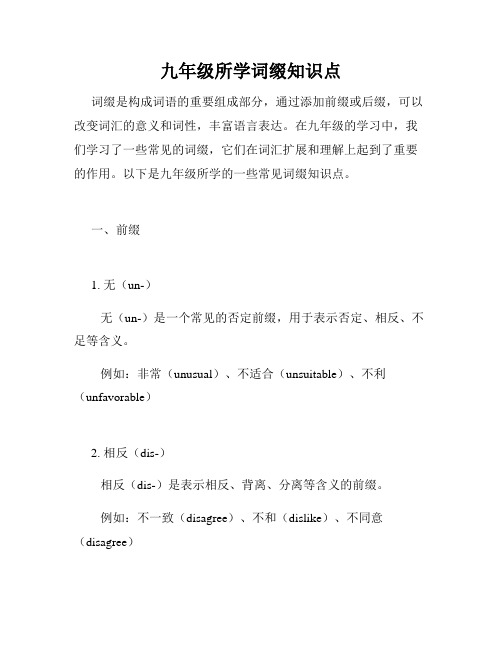
九年级所学词缀知识点词缀是构成词语的重要组成部分,通过添加前缀或后缀,可以改变词汇的意义和词性,丰富语言表达。
在九年级的学习中,我们学习了一些常见的词缀,它们在词汇扩展和理解上起到了重要的作用。
以下是九年级所学的一些常见词缀知识点。
一、前缀1. 无(un-)无(un-)是一个常见的否定前缀,用于表示否定、相反、不足等含义。
例如:非常(unusual)、不适合(unsuitable)、不利(unfavorable)2. 相反(dis-)相反(dis-)是表示相反、背离、分离等含义的前缀。
例如:不一致(disagree)、不和(dislike)、不同意(disagree)3. 全(ex-)全(ex-)表示超出、离开、以及过去的含义。
例如:超过(exceed)、退出(exit)、以往(ex-boyfriend)4. 反(anti-)反(anti-)表示反对、对抗等含义,来自希腊语。
例如:反对(anti-establishment)、抗议(anti-war)、对抗(antidote)二、后缀1. 增加(-ment)增加(-ment)是名词后缀,用于表示行为、状态、结果。
例如:装备(equipment)、建议(advice)、发展(development)2. 形容词(-ful)形容词(-ful)是后缀,表示“充满某种特点”的意思。
例如:美丽的(beautiful)、成功的(successful)、有希望的(hopeful)3. 动词(-ize)动词(-ize)是后缀,用于动词后,表示使动作发生或使成为。
例如:民主化(democratize)、数字化(digitize)、实现(realize)4. 人(-er)人(-er)是名词后缀,用于表示从事某种职业或具有某种特征的人。
例如:教师(teacher)、演员(actor)、记者(reporter)三、前缀和后缀的变化有些前缀和后缀在不同词性之间转化时,会有一定的变化。
英语单词中,常用的前缀和后缀50个
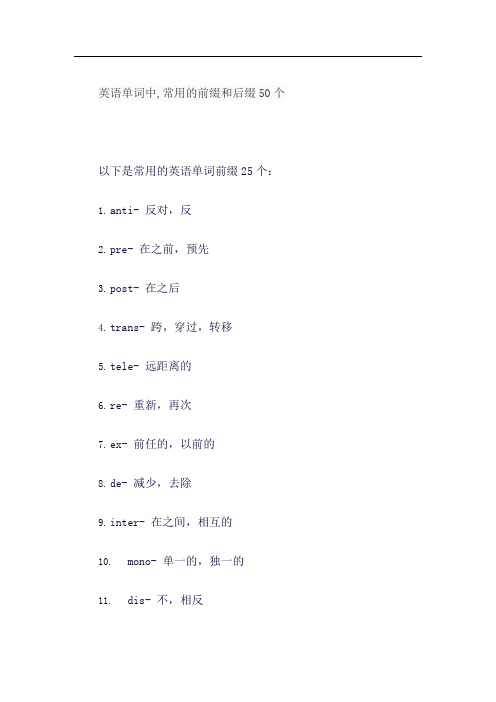
英语单词中,常用的前缀和后缀50个以下是常用的英语单词前缀25个:1.anti- 反对,反2.pre- 在之前,预先3.post- 在之后4.trans- 跨,穿过,转移5.tele- 远距离的6.re- 重新,再次7.ex- 前任的,以前的8.de- 减少,去除9.inter- 在之间,相互的10.mono- 单一的,独一的11.dis- 不,相反12.en- 使成为,使进入13.a- 表示“在...之上”,“在...之中”14.in- 表示“在...之内”,“缺乏”15.under- 表示“在...之下”,“不足”16.over- 表示“在...之上”,“超过”17.out- 表示“向外”,“出来”18.up- 表示“向上”,“起来”19.down- 表示“向下”,“下去”20.off- 表示“离开”,“脱落”21.to- 表示“向...”,“到...为止”22.from- 表示“来自...”,“由...开始”23.by- 表示“由...”,“被...”24.for- 表示“为了...”,“当作”25.through- 表示“通过...”,“自始至终”以下是常用的英语单词后缀25个:1.-ness 状态或性质2.-tion 动或过程的结果3.-ity 性质或状态4.-ism 表示"主义"或"宗教"5.-ity 表示"行为"、"状态"或"性质"6.-ity 表示"名词化"7.-ing 表示"行为"、"状态"或"性质"8.-al 动作的结果或情况9.-ar 通常的意思或情况10.-or 行为的人或物11.-er 动作的人或物12.-en 使变成,行为使…变得…13.-ant 表示行为、状态、品质、思想等14.-ent 表示人、物、行为等15.-ive 有…性质的,有…作用的16.-ic 形容词后缀,表示…的17.-id 与…相同的,具有…性质的18.-ous 多音节的形容词后缀,表示…的19.-ful 形容词后缀,表示充满的、有…性质的20.-less 没有…的,不…的21.-ley 名词后缀,表示在…地方、在…情况下22.-ity 名词后缀,表示性质、状态等23.-ness 名词后缀,表示状态、性质、情况等24.-ship 名词后缀,表示某种技能、资格等25.-ing 名词后缀,表示行为、事情等。
初中英语常见词缀归纳大全
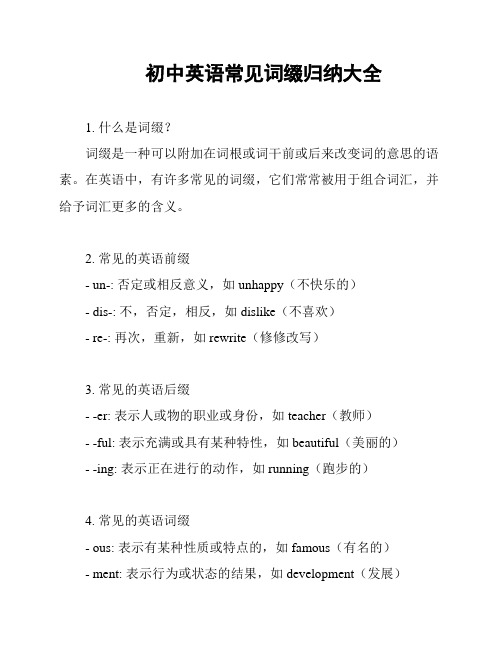
初中英语常见词缀归纳大全
1. 什么是词缀?
词缀是一种可以附加在词根或词干前或后来改变词的意思的语素。
在英语中,有许多常见的词缀,它们常常被用于组合词汇,并给予词汇更多的含义。
2. 常见的英语前缀
- un-: 否定或相反意义,如unhappy(不快乐的)
- dis-: 不,否定,相反,如dislike(不喜欢)
- re-: 再次,重新,如rewrite(修修改写)
3. 常见的英语后缀
- -er: 表示人或物的职业或身份,如teacher(教师)
- -ful: 表示充满或具有某种特性,如beautiful(美丽的)
- -ing: 表示正在进行的动作,如running(跑步的)
4. 常见的英语词缀
- ous: 表示有某种性质或特点的,如famous(有名的)
- ment: 表示行为或状态的结果,如development(发展)
5. 注意事项
- 在使用词缀时,需要注意词义和语法的变化。
- 有些词缀可能会改变词的词性,需要注意上下文的使用。
- 词缀的使用要准确合理,避免产生歧义或错误理解。
以上是初中英语常见的词缀归纳大全,希望对你的研究有所帮助!
总字数:{word_count}。
英语单词常见前后缀及含义

英语单词常见前后缀及含义一、常见前缀。
1. un - [ʌn](否定前缀,形容词或动词)- 含义:表示“不,无,非”。
- 例词:- unhappy [ʌnˈhæpi](形容词),意为“不快乐的”。
- unlock [ˌʌnˈlɒk](动词),表示“开锁;开启”。
2. dis - [dɪs](否定前缀,动词、形容词、名词)- 含义:表示“不,相反”。
- 例词:- dislike [dɪsˈlaɪk](动词),意思是“不喜欢”。
- dishonest [dɪsˈɒnɪst](形容词),表示“不诚实的”。
- disadvantage [ˌdɪsədˈvɑ:ntɪdʒ](名词),意为“不利条件”。
3. in - [ɪn](否定前缀,形容词),在字母l前变为il - [ɪl],在字母m、p前变为im - [ɪm],在字母r前变为ir - [ɪr]- 含义:表示“不,无”。
- 例词:- incorrect [ˌɪnkəˈrekt](形容词),意思是“不正确的”。
- illegal [ɪˈli:gl](形容词),表示“非法的”。
- impossible [ɪmˈpɒsəbl](形容词),意为“不可能的”。
- irregular [ɪˈreɡjələ(r)](形容词),表示“不规则的”。
4. re - [ri:](动词前缀)- 含义:表示“再,又;重新”。
- 例词:- rewrite [ˌri:ˈraɪt](动词),意为“重写”。
- review [rɪˈvju:](动词),表示“复习;回顾”。
5. pre - [pri:](前缀,形容词、动词、名词)- 含义:表示“在……之前”。
- 例词:- pre - war [ˈpri: wɔ:(r)](形容词),意思是“战前的”。
- preview [ˈpri:vju:](动词),表示“预习;预演”。
- preposition [ˌprepəˈzɪʃn](名词),意为“介词”。
中学阶段必须掌握的前后缀(八一学校张运学)
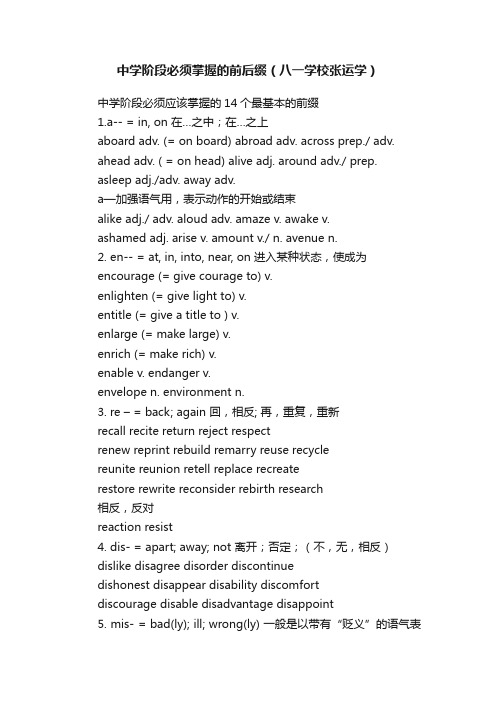
中学阶段必须掌握的前后缀(八一学校张运学)中学阶段必须应该掌握的14个最基本的前缀1.a-- = in, on 在…之中;在…之上aboard adv. (= on board) abroad adv. across prep./ adv. ahead adv. ( = on head) alive adj. around adv./ prep. asleep adj./adv. away adv.a—加强语气用,表示动作的开始或结束alike adj./ adv. aloud adv. amaze v. awake v.ashamed adj. arise v. amount v./ n. avenue n.2. en-- = at, in, into, near, on 进入某种状态,使成为encourage (= give courage to) v.enlighten (= give light to) v.entitle (= give a title to ) v.enlarge (= make large) v.enrich (= make rich) v.enable v. endanger v.envelope n. environment n.3. re – = back; again 回,相反; 再,重复,重新recall recite return reject respectrenew reprint rebuild remarry reuse recyclereunite reunion retell replace recreaterestore rewrite reconsider rebirth research相反,反对reaction resist4. dis- = apart; away; not 离开;否定;(不,无,相反)dislike disagree disorder discontinuedishonest disappear disability discomfortdiscourage disable disadvantage disappoint5. mis- = bad(ly); ill; wrong(ly) 一般是以带有“贬义”的语气表示错误,也可单表“否定”(误,错,恶,不)misarrange v. misbehave v. misfortune n.mislead v. misplace v. mistake n. ( = wrongly + get)mistrust n./ v. misunderstand v. misspellmishear misread misremember mistreat6. un- 不Unreal uncomfortable unfriendly unhappyUnfortunately unfit unfair无Unconditional unlimited非Unjust unofficial未Uncorrected unchanged unfinished undecided unknown 相反动作取消,除去Uncover unlock untie7. non- 不;非;无Nonsmoker nondrinker no cooperation nonstop8. in—Incorrect incomplete inhuman injustice informalInfamous invisible innutrition inefficient9 il—Illegal illogical illiterate10. ir—Irregular irreligious irresistible irresponsible11. im- (用在b,m,p之前)Impossible imperfect impolite imbalance impatient impractical12. inter --- = between, among 相互,之间International interpersonal internet interrupt intervene13. tele = far off 远距离;远程Telephone telescope telegram telegraph television telegraph14. kilo- Kilometer kilogram中学阶段必须应该掌握的(20+16+3+5+3=)47个最基本的后缀20个基本名词后缀1. ---age package postage courage2. ---er farmer thinker3. ---or visitor conductor editor governor4. ---ar beggar liar scholar5. –ese Chinese Japanese6. –ian musician Asian Russian7. –ist artist pianist scientist communist8. –ism communism Marxism modernism9. ---ty (–ity, --ety) cruelty loyalty safety ability purity anxiety variety10. –ment government movement development11. –ness business illness darkness12. –ion invention liberation education discussion13. –al arrival survival trial14. –ship friendship fellowship scholarship relationship15. ---dom freedom kingdom16. ---ess actress hostess empress princess17. –th growth warmth strength18. –ance (--ence) absence appearance confidence innocence silence19. –hood childhood brotherhood neighborhood16个基本形容词后缀1. –al physical national political2. –an American Italian Australian3. –able /--ible reasonable comfortable horrible possible4. –ed excited moved frightened5. –ing boring tiring interesting6. –ern southern northern eastern7. –ful helpful useful careful8. –ish foolish English bookish childish9. –ive active instructive expensive10.—less careless useless harmless helpless11. ---ous poisonous mountainous dangerous12. ---y cloudy windy dirty13. –ic academic alcoholic energetic14. –ly friendly monthly manly15. –proof soundproof waterproof fireproof16. –some quarrelsome tiresome troublesome3个基本副词后缀1. –ly actually shortly badly angrily2. –ward(s) towards forward outward southwards3. –s besides indoors outdoors sometimes5个基本动词后缀1. –en golden wooden widen blacken2. –(i)fy beautify terrify satisfy3. –ize/--ise apologize organize realize4. –ate assassinate celebrate congratulate isolate5. –ish cherish publish punish blush3个数词后缀1. –teen fourteen fifteen eighteen2. –ty forty fifty ninety3. –th twelfth twentieth ninth补充拓展前缀前pro-- protect programpre-- predict previewfore-- foresee forehead后post-- postwar postscript超越;在上super-- superhero superstarsur--- surface surviveover-- overlook overflow往下;在下;不全de-- decrease destructunder--- underground underdevelopedsup/sub--- suppose subway subtitle内in/im-- include import impress外ex--- export express中间inter--/intro--- international internet introduction internal反对ob/op--- object oppressanti--- antiwar antibiotic Antarctic共同com/cor/col/con--- compose combine correct corrupt collect conclude表示“一”拉丁文前缀:un--/ uni--unify vt. union n.uniform n.希腊文前缀mono—monologue n. monopoly n.表示“二”bi—biplane n. bilingual adj. bicycle n.di—dialogue n. dilemma n.divorce n./vt. divide v.表示“三”tri—triple adj. triangle n.trinity n. (Trinity College)trivialunique project impress reaction destruction联想记忆法chill image spark snowflake trail isolate一读nutrition curse pest famine ambulance hacker spider二拼schedule leisure innocent hesitate fashion三变形garage gloom四拆discipline scream fate bride bridegroom trivial vicar bishop五分drown poise routine六开屏engine rub temper。
九年级英语单词最常用的前缀后缀汇总

九年级英语单词最常用的前缀后缀汇总九年级英语单词最常用的前缀后缀汇总前缀1 a- 加在单词或词根前面, 表示不,无,非2 a- 加在单词前, 表示在..., ...的3 ab-, abs- 加在词根前,表示相反,变坏,离去等4 ab-, ac-, ad-, af-, ag-, an-, ap-, ar-, as-, at- 等加在同辅音字母词根前,表示一再等加强意5 ad- 加在单词或词根前, 表示做....., 加强......6 amphi- 表示两个、两种7 an- 在词根前, 表示不,无8 ana- 表示错误,在旁边,分开9 ante- 表示前面,先10 anti- 表示反对,相反11 apo- 表示离开,远离12 auto- 表示自动、自已13 be- 构成动词,表示使......成为14 be- 构成一些介词15 bene- 表示善, 好16 bi- 表示二个, 两17 by- 表示在旁边,副的18 cata- 表示向下,相反,离开19 circum- 表示环绕,周围20 co- 表示共同,通常放元音词根前21 col-, cor- 在同辅音词根前, 表示共同22 com-, con- 表示共同23 contra - 表示反对,相反24 counter - 表示反对,相反25 de- 表示去掉,变坏,离开,变慢,向下等26 de- 表示使....成为,加强等27 deca- 表示十28 deci- 表示十分之一29 demi- 表示半30 di- 表示二个,双31 di- 表示使...变成,分开,离开32 dia- 表示穿过,二者之间33 dif- 和辅音重复表示不,否定,分开34 dis- 表示不,消失掉35 dis- 表示分开,分离36 dys- 表示坏,不良37 e-, ef- 表示出,出来,38 em-, en-, 表示进入... 之中,包围39 em-,en-, 表示使..... 进入状态40 endo- 表示内部41 epi- 表示在...上,在...周围,在...后面42 eu- 表示好,优秀43 ex- 表示出,出去44 ex- 表示前面的,前任的45 exo- 表示外部的,外面46 extra- 表示以外的,超过的47 fore- 表示前面,预先48 hecto- 表示百,许多49 hemi- 表示半50 hepta- 表示七51 hetero- 表示异类,异种52 hexa- 表示六53 holo- 表示全部'54 homo- 表示同类的55 hyper- 表示超过,太多56 hypo- 表示下面,次等57 il-, ir- 辅音重复表示不,无58 il-,ir- 表示使.....成为,进入59 im-, in- 表示不,无,非60 im-,in- 表示向内,进入61 inter- 表示在..... 之间,相互62 intra- 表示在内,内部63 intro- 表示向内,入内64 iso- 表示等, 同65 kilo- 表示一千66 macro- 表示宏传,大67 mal-; male 表示坏,恶68 meta- 表示超过, 改变69 micro- 表示微,小70 milli- 表示千,千分之一71 mini- 表示小72 mis- 表示错误,坏73 mono- 表示单个,一个74 multi- 表示多,很多75 neo- 表示新的76 non- 表示不,非77 ob- 表示逆,倒,加强意义78 octa- 表示八 ; 亦作octo79 omni- 表示全部,到处80 out- 示超过,过度81 out- 表示出去,过时82 over- 表示过度,过份83 over- 表示翻转84 over- 表示在... 之上85 paleo- 表示古,旧86 pan- 表示广泛的87 para- 表示半,类似,辅助88 para- 表示旁边89 para- 表示降落伞90 pen- 表示近似,差不多91 penta- 表示五92 per- 表示贯穿,自始至终93 per- 表示假,坏94 peri- 表示周围,靠近95 poly- 表示多96 post- 表示在后面97 post- 表示邮件,邮政98 pre- 表示 ...前的,预先99 pro- 表示赞同,亲...100 pro- 表示向前,在前101 pro- 表示很多...102 proto- 表示原始...103 pseudo- 表示假,伪104 quadri-,quadru- 表示四105 quasi- 表示类似,准106 re- 表示向后,相反107 re- 表示一再,重新108 retro- 表示向后,倒退109 se- 表示分开,离开,区别开110 semi- 表示半111 sept-,septi- 表示七112 sex-, sexi- 表示六113 step- 表示后,继或前夫(妻)所生114 stereo- 表示立体115 sub- 表示在下面,次一等,副手116 sub- 表示接近,靠近117 suc-, suf-, sup-, sur- 等辅音重复表示在...下面118 super- 表示在...上面119 super- 表示超级,超过,过度120 supra- 表示超...121 sur- 辅音不重复表示超过,在上面122 sus- 表示在... 下面123 sym-, syn- 表示共同,相同124 tetra- 表示四125 trans- 表示横过,越过126 trans- 表示变换,改变';转移127 tri- 表示三128 twi- 表示二、两129 ultra- 表示极端130 ultra- 表示超出,超过131 un- 表示不,无,非,没有132 un- 表示打开,解开,弄出133 under- 表示在...下,在...之内134 under- 表示不足,不够135 under- 表示副手 3136 uni- 表示一个、单一137 vice- 表示副138 with- 表示向后,相反。
初中英语词缀归纳总结

初中英语词缀归纳总结英语词缀是构成英语单词的基本元素之一,它们可以改变单词的词性、含义以及语法功能。
在初中英语词汇学习中,了解和掌握常见的词缀对于提高词汇量和理解词汇的构成有着重要的作用。
本文将对初中英语中常见的几种词缀进行归纳总结。
一、前缀(Prefix)前缀是在单词的开头加上的一种词缀,它可以改变单词的意思或者词性。
以下是初中英语常见的前缀:1. un-:表示否定、相反,如unhappy(不开心的)、uncertain(不确定的)。
2. re-:表示重新或再次,如return(返回)、rewrite(重写)。
3. dis-:表示不、否定,如dislike(不喜欢)、disagree(不同意)。
4. pre-:表示在前、之前,如pretest(预测)、preview(预览)。
二、后缀(Suffix)后缀是在单词的结尾加上的一种词缀,它可以改变单词的意思、词性或者形态。
以下是初中英语常见的后缀:1. -ful:表示充满、有...特征的,如beautiful(美丽的)、careful(小心的)。
2. -less:表示没有、缺乏,如hopeless(绝望的)、useless(无用的)。
3. -er:表示人或物的职业、身份,如teacher(教师)、writer(作家)。
4. -able:表示能够、有能力的,如comfortable(舒适的)、understandable(可理解的)。
三、词根(Root)词根是单词中最基本、最核心的部分,它能够表达一个单词的基本意思。
了解常见的词根有助于我们理解和记忆单词。
以下是一些常见的词根及其意思:1. bio-:表示生命,如biology(生物学)、biography(传记)。
2. tele-:表示远程、远距离,如television(电视)、telephone(电话)。
3. aud-:表示听、听觉,如audio(音频)、audience(观众)。
4. graph-:表示写、描述,如graphite(石墨)、graphic(图表)。
初中阶段常见的前后缀总结
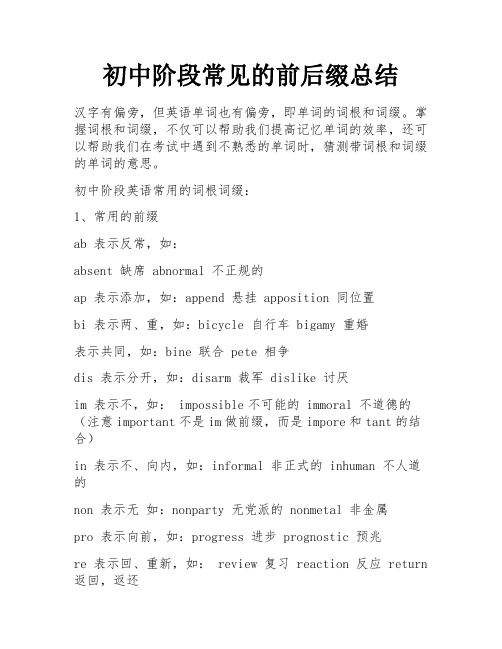
初中阶段常见的前后缀总结汉字有偏旁,但英语单词也有偏旁,即单词的词根和词缀。
掌握词根和词缀,不仅可以帮助我们提高记忆单词的效率,还可以帮助我们在考试中遇到不熟悉的单词时,猜测带词根和词缀的单词的意思。
初中阶段英语常用的词根词缀:1、常用的前缀ab 表示反常,如:absent 缺席 abnormal 不正规的ap 表示添加,如:append 悬挂 apposition 同位置bi 表示两、重,如:bicycle 自行车 bigamy 重婚表示共同,如:bine 联合 pete 相争dis 表示分开,如:disarm 裁军 dislike 讨厌im 表示不,如: impossible不可能的 immoral 不道德的(注意important不是im做前缀,而是impore和tant的结合)in 表示不、向内,如:informal 非正式的 inhuman 不人道的non 表示无如:nonparty 无党派的 nonmetal 非金属pro 表示向前,如:progress 进步 prognostic 预兆re 表示回、重新,如: review 复习 reaction 反应 return 返回,返还un 表示不、非,如:unhappy 不快乐的 unbalance 失去平衡unlike不像(注意区别dislike“不喜欢”的意思)2、常用的后缀al 表示人、物,如:rival 竞争者 mural 壁画cy 表示状态、职位,如:bankruptcy 破产 captaincy 船长er 表示人、物,如:teacher 老师 singer歌手 writer作家waiter服务员 worker打工人 cooker 厨具(注意er还是大部分形容词的比较级后缀)able 表示可以的,是形容词的后缀。
如: movable 可移动的passable 可通行的 possible可能的fortable,changeable,reliable,suitable,acceptableful 表示充满,是形容词的后缀。
初中英语单词常用词缀及前缀后缀词汇一览表
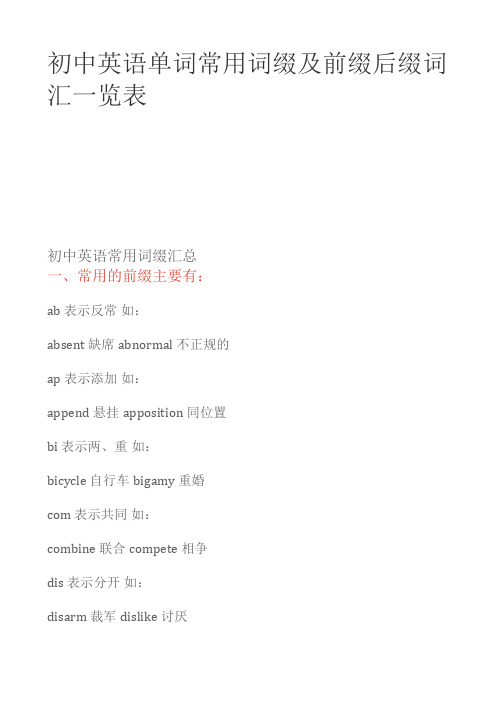
初中英语单词常用词缀及前缀后缀词汇一览表初中英语常用词缀汇总一、常用的前缀主要有:ab 表示反常如:absent 缺席abnormal 不正规的ap 表示添加如:append 悬挂apposition 同位置bi 表示两、重如:bicycle 自行车bigamy 重婚com 表示共同如:combine 联合compete 相争dis 表示分开如:disarm 裁军dislike 讨厌im 表示不如:impossible不可能的immoral 不道德的in 表示不、向内如:informal 非正式的inhuman 不人道的non 表示无如:nonparty 无党派的nonmetal 非金属pro 表示向前如:progress 进步prognostic 预兆re 表示回、重新如:review 复习reaction 反应un 表示不、非如:unhappy 不快乐的unbalance 失去平衡二、常用的后缀主要有:al 表示人、物如:rival 竞争者mural 壁画cy 表示状态、职位如:bankruptcy 破产captaincy 船长er 表示人、物如:teacher 老师cooker 厨具able 表示可能的如:movable 可移动的passable 可通行的ful 表示充满如:beautiful 美丽的useful 有用的or 表示人、物如:actor 男演员mirror 镜子ist 表示人如:copyist 抄写员socialist 社会主义者ment 表示行为如:enjoyment 娱乐movement 运动ing 表示令人如:exciting 令人兴奋的interesting 令人有兴趣的ed 表示感到如:excited 感到兴奋的interested 感到有兴趣的less 表示没有的如:resistless 不抵抗的homeless 无家可归的ly 副词后缀如:gently 轻轻地intently 专心地tion 名词后缀如:graduation 毕业relation 亲属3、典型的前后缀应用举例:1、excite vt.刺激exciting adj. 令人兴奋的excited adj.感到兴奋的excitement n.兴奋2、smile v./n.微笑smiling adj. 微笑的smilingly adv.微笑的unsmiling adj.不笑的初中英语单词构词法前缀后缀词汇一览表【前缀】un- “不”happy unhappylike unlikeusual unusualfriendly unfriendlyim-“不”possibleimpossible【后缀】-er“人”teach teacherplay playerclean cleanerdrive driver(以e结尾,-r)run runner(重读闭音节,双写-er)win winnertravel traveller-or“人”invent inventorvisit visitor-ly(副词后缀)bad badly / quick quickly careful carefully / happy happily deep deeply / lucky luckily usual usually noisy noisily slow slowly / angry angrilystrong strongly /quiet quietly 【特例】true trulyterrible terriblypossible possibly-ful(形容词后缀)care carefulhelp helpfuluse usefulforget forgetful-y (形容词后缀)rain rainyluck luckycloud cloudynoise noisy(以e结尾,去e,加-y) snow snowysun sunny(双写,加-y)wind windy-ion(名词后缀)invent inventionoperate operation-ness(名词后缀)busy businessgood goodness【一些特例】动词---形容词sleep asleepdie deadenjoy enjoyable动词---现在分词转化为名词boat boatingbuild buildingbegin beginningcross crossingmeet meetingturn turning名词---形容词friend friendlysouth southernwool woolendanger dangerous difference differentfry friedworry worried动词---过去分词转为形容词break brokenlose lost please pleased colour coloured动词---名词know knowledgefly flightplease pleasure名词---名词farm farmer 农夫动词---现在分词、过去分词转为形容词follow followinginterest interested“感兴趣的”只作表语,仅用于be interested ininteresting “有趣的”可作表语和定语develop developed “发达的”developing “发展中的”词根词缀记忆法常常被英语初学者所忽略,如果将此法配合多遍反复记法在自学中应用则可以做到举一至少反三的妙用,词根词缀组成规律亦是英语专业中词汇学必讲必学的一门课程。
初中英语常见的前缀和后缀
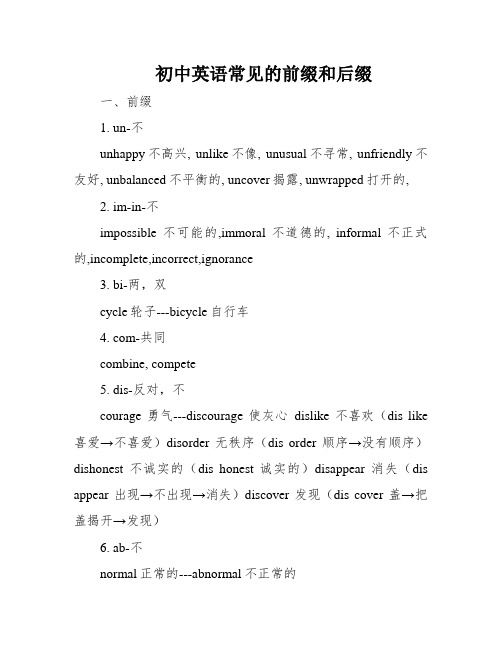
初中英语常见的前缀和后缀一、前缀1. un-不unhappy不高兴, unlike不像, unusual不寻常, unfriendly不友好, unbalanced不平衡的, uncover揭露, unwrapped打开的,2. im-in-不impossible不可能的,immoral不道德的, informal不正式的,incomplete,incorrect,ignorance3. bi-两,双cycle轮子---bicycle自行车4. com-共同combine, compete5. dis-反对,不courage勇气---discourage使灰心dislike不喜欢(dis like 喜爱→不喜爱)disorder无秩序(dis order顺序→没有顺序)dishonest不诚实的(dis honest诚实的)disappear消失(dis appear出现→不出现→消失)discover发现(dis cover盖→把盖揭开→发现)6. ab-不normal正常的---abnormal不正常的7. non-非party党---nonparty无党派的, verbal口头的---nonverbal非口头的, mental精神的---nonmental非精神的8. re-再一次view寓目---review再一次寓目-引申为温习,批评action 行动—reaction回响反映,replay(re play播放→重放,回放)二、后缀1. -less没有(形容词后缀)例:careless粗心的, hopeless没有希望的, count数---countless数不清的,homeless无家可归的, endless无尽头的,无尽的, useless没用的, helpless无助的2. -ful充溢的(形容词后缀)careful(care关怀ful→谨慎的,认真的), colorful花团锦簇的, meaningful有意义的, wonderful(wonder奇迹ful→出色的), beautiful美丽的,successful成功的,useful有用的的,forgetful忘记的3. -ment行为(名词后缀)excitement兴奋(excite使兴奋ment→兴奋), enjoyment 喜欢, movement运动,development发展, treatment对待,治疗, entertainment娱乐,disappointment失望,encouragement鼓4. -ive(形容词后缀)effective(effect效果ive→有效的), subjective主观的, objective客观的5. -er(表人的后缀)Teacher老师, cleaner清洁工, runner跑步者, traveler旅行者, winner赢家,singer歌手, writer作家,driver司机, worker工人, leader领导, foreigner外国人,farmer农民6.-or(表人的后缀)actor演员, inventor发明家, visitor参观者7.-ist(表人的后缀)。
英语单词前缀和后缀的分类初中
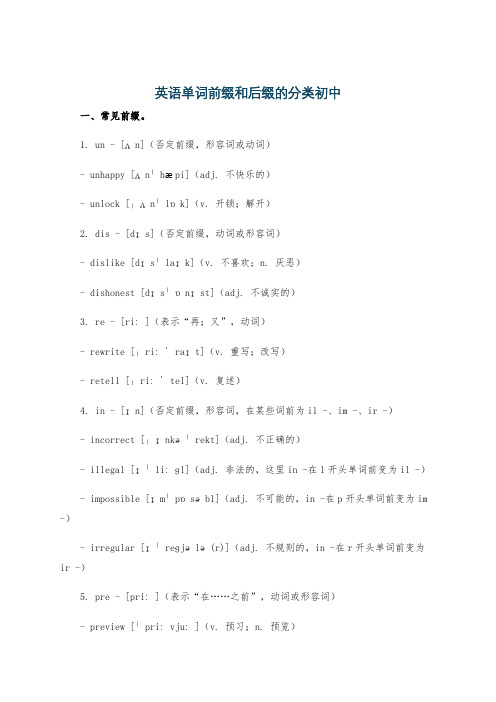
英语单词前缀和后缀的分类初中一、常见前缀。
1. un - [ʌn](否定前缀,形容词或动词)- unhappy [ʌnˈhæpi](adj. 不快乐的)- unlock [ˌʌnˈlɒk](v. 开锁;解开)2. dis - [dɪs](否定前缀,动词或形容词)- dislike [dɪsˈlaɪk](v. 不喜欢;n. 厌恶)- dishonest [dɪsˈɒnɪst](adj. 不诚实的)3. re - [riː](表示“再;又”,动词)- rewrite [ˌriːˈraɪt](v. 重写;改写)- retell [ˌriːˈtel](v. 复述)4. in - [ɪn](否定前缀,形容词,在某些词前为il -、im -、ir -)- incorrect [ˌɪnkəˈrekt](adj. 不正确的)- illegal [ɪˈliːɡl](adj. 非法的,这里in -在l开头单词前变为il -)- impossible [ɪmˈpɒsəbl](adj. 不可能的,in -在p开头单词前变为im -)- irregular [ɪˈreɡjələ(r)](adj. 不规则的,in -在r开头单词前变为ir -)5. pre - [priː](表示“在……之前”,动词或形容词)- preview [ˈpriːvjuː](v. 预习;n. 预览)- pre - war [ˈpriː wɔː(r)](adj. 战前的)二、常见后缀。
1. - er [ə(r)](表示“人或物”,名词)- teacher [ˈtiːtʃə(r)](n. 教师)- cleaner [ˈkliːnə(r)](n. 清洁工;清洁器)2. - or [ɔː(r)](表示“人或物”,名词)- actor [ˈæktə(r)](n. 男演员)- visitor [ˈvɪzɪtə(r)](n. 访问者;参观者)3. - ful [fʊl](形容词后缀,“充满……的”)- helpful [ˈhelpfʊl](adj. 有帮助的)- beautiful [ˈbjuːtɪfʊl](adj. 美丽的)4. - less [lɪs](形容词后缀,“无……的;少……的”)- homeless [ˈhəʊmlɪs](adj. 无家可归的)- careless [ˈkeəlɪs](adj. 粗心的)5. - ly [li](副词后缀,形容词 + ly变为副词)- quickly [ˈkwɪkli](adv. 迅速地)- carefully [ˈkeəfəli](adv. 仔细地)6. - tion [ʃn](名词后缀,动词 + tion变为名词)- action [ˈækʃn](n. 行动)- education [ˌedʒuˈkeɪʃn](n. 教育)7. - ing [ɪŋ](可作名词后缀表示“行为;事情”,也可作动词的现在分词形式)- reading [ˈriːdɪŋ](n. 阅读;v. read的现在分词)- running [ˈrʌnɪŋ](n. 跑步;v. run的现在分词)8. - ed [d]或[t]或[ɪd](动词的过去式和过去分词形式,也可作形容词后缀表示“感到……的”)- worked [wɜːkt](v. work的过去式和过去分词)- interested [ˈɪntrəstɪd](adj. 感兴趣的)。
中学生常用英语前缀后缀

英语单词常用前缀和后缀前缀一.表示否定的前缀1.dis-加在名词、形容词,动词之前。
disabled(有残疾的) disadvantage(缺点)disagree(不同意)disarm(解除武装)disconnect(失去联系)2.in-加在形容词,名词之前incorrect(不正确的), inactive(不积极的), informal(非正式的), infamous( 声名狼藉的),3.im-加在字母m, b, p之前impossible(不顺能的),impolite(不礼貌的),impatient(没耐心的)4.un-加在名词,形容词,副词之前unfortunate(不幸的), unhappy(不高兴的), unlucky(不幸运的), unfinished(未完成的)undoubted(无疑的)5.non-加在形容词,名词前non-existence(不存在),non-violence(非暴力),non-electrical(非电的)6.mis-加在动词、名词之前misuse(误用,滥用), misunderstand(误解),misjudge(误判),misleading(误导),7.anti-加在名词、形容词之前anti-Japanese(抗日战争的),anti-social(厌恶社会的,反社会的),antifreeze(防冻剂)二.表示“前before”的前缀1.pre-preconception(成见),pre-existing(先于……而存在的),pre-selection(选举前的)preface(前言)prefix(前缀), preposition(介词).2.fore-forehead(前额),foreman(工头,领班),foresee(预见,先见),foretell(预言)3.ex-ex-president(前任总统),ex-wife(前妻)三.表示“后-post”的前缀1.post-post-war(战后),post-position(后置词),postmeridian(下午)四.表示“回”、“再次”、“向后”的前缀1.re-repeat(重复),rebirth(重生),retranslate(再译),rebuild(加强),reconstruct(重建),return(返回)五.表示“共同”、“和”的前缀1.co-co-exist(共存),co-operate(合作),co-education(男女同校),六.表示“相互”、“之间”的前缀1.inter-international(国际的), interchangeable(可互换的),interdependent(互相依靠的)七.其它的前缀1.auto-自动automatic(自动的),autobiography(自传)2.mal-坏,恶malnutrition(营养不良),maltreat(虐待)3.micro-microscope(显微镜),Microsoft(微软),microtome(切片机),microwave(微波)4.tele-远telegram(电报),telephone(电话),telescope(望远镜),tele-education(远程教育),5.demi-, semi- hemi-semi-circle(半圆),hemisphere(半球),demilune(半月,新月)6.bi-, di-二biyearly(二年一次的),biweekly(二周一次的),dichloride(二氯化物),bicycle(自行车)7.tri-三triangle(三角),tripod(三角架),tricycle(三轮车), trilogy(三部曲)8.multi-多multi-colored(颜色多样的),multi-national(多国的),multimedia(多媒体), multi-gym(多功能健身器) 9.trans-通过,横过transcript(抄本, 副本; 记录),translation(翻译),transparent(透明的),transport(运输),trans-plant (移植)10.com-,con-, cor-, col-共同,和,完全comment(评论),compile(编辑),correlation(相互关系),collect(收集),corruption(贪污腐败),collaborate(合作,合著)11.en-,em-往……里,使……encamp(扎营),enable(使……能),endear(使……受喜爱),empower(给。
- 1、下载文档前请自行甄别文档内容的完整性,平台不提供额外的编辑、内容补充、找答案等附加服务。
- 2、"仅部分预览"的文档,不可在线预览部分如存在完整性等问题,可反馈申请退款(可完整预览的文档不适用该条件!)。
- 3、如文档侵犯您的权益,请联系客服反馈,我们会尽快为您处理(人工客服工作时间:9:00-18:30)。
bimultiauto-
双 多 自动,自主
bicycle multinational Automobile汽车,automation(自动化)
anti- 反、防
anti-tank, anti-social
extrans-
前 跨越;移
ex-president, ex-wife transport, translate
re-
2.回,返
reappear, return
forepre-
时间或位置的“在 foresee, foreleg,foretell 前面”(= before) 预言, foreknow预卜
在前、事先、预先 prepay, prewar, preschool,
(before)
prehistory
前缀 postintermulti-
意义 时间和顺序的“在后 边” (= after)
互相(= between, among)
多,多种
midtelede-
ensuper-
中间(= middle) 远 1.否定;2.下;3.强调
使 超级、在之上
例词 post-war, postgraduate interact international multinational multi-cultural midday, midnight television, telegram defeat, decode, decrease
写出下面单词的前缀
? important重要的→___important 不重要的 ? appear出现→____appear 消失 ? correct正确的→___correct 不正确的 ? lead带领→___lead领错
? __ lone单独的 ? ___ chart自动图表 ? __ joy使高兴 ? ___way地铁 ? ___use再用
...(专)家/..工作者 politician, musician
从事...职业/文艺/ artist, socialist,
学术的人
physicist
从事某工作的物 washer, cooker
从事某工作的物 conductor 导体
其他名词后缀
前缀 意 义
例词
-ing
状态
feeling ,reading
enable, encourage
superpower, superhero
前缀 subsemivice-
意义 下面的;次 半 副
例词 subway, subtitle semi-final,semiconductor( 半导体) vice-premier, vice-chairman
uni-
单
uniform
-th
性质,状态 growth, length, wealth, truth
后缀 -(a)ble -al -ic, -ical -ant, -ent -ish -ive -ful -less -ous -y -ed -en -ern -ly
形容词后缀
意义
例词
可/能…的
v和 cor-,col-
co-
联合、共同
例词 asleep, along, aloud, alive, across, abroad 在国 外,aboard 在船/火车/飞机上 comment, collect,
co-worker, coexist
1.再一次,重新 renew, reborn, rebuild,
后缀 -er 表 -or -eer 示 -ess 人 -ian -ist
表 -er 示 物 -or
表示人和物的名词后缀
意义
例词
从事…职业的人 teacher, worker, learner
与-er同义 从事于...的人
女...的
visitor, educator, translator engineer, volunteer, mountaineer actress, waitress, hostess
irregular, inability,
表示否定 表示相反
dishonest, disappear, disagree dislike, disbelieve
表示错、误 mistake, misfortune,不幸 misunderstanding误解
前缀 a-
意义 1.在…上/里 2.去(to)
初中英语常见的前缀和后缀
常见的否定前缀
前缀
意义
例
词
un-
in- ,ilim- ,irdismis-
不,未(= not)
unhappy, unnecessary, unusual, ,
unexpected,
相反动作 uncover, untie, unlock, undress
不, 非, 无 incomplete, impossible. impolite,
active, expensive
充满...的
thankful, powerful, tearful
表示否定
homeless, harmless, wireless
充满...的,有...特征
dangerous, famous, nervous
有... 性质的
natural, technical, actual
...性质的,与...有关的
musical, basic, scientific
...的
important, pleasant, excellent
稍带...的/... 语的
childish, English, Spanish
有...倾向的/性质的
___gas防毒气的 ___operate 合作 ___net互联网 ___phone 电话
找出课文中还有所学词缀的单词
说出下列前缀的意思
? sub? com? pre? mis? im? un? tele? re-
? en? uni? trans? a? dis? inter? multi? fore? post-
-ion/ -tion/ -sion -ment
动作;过程
action, decision, pollution, pronunciation
性质;状态 development ,government
-ness 性质;状态 happiness ,sadness ,illness
-ure
状态
failure ,pleasure
